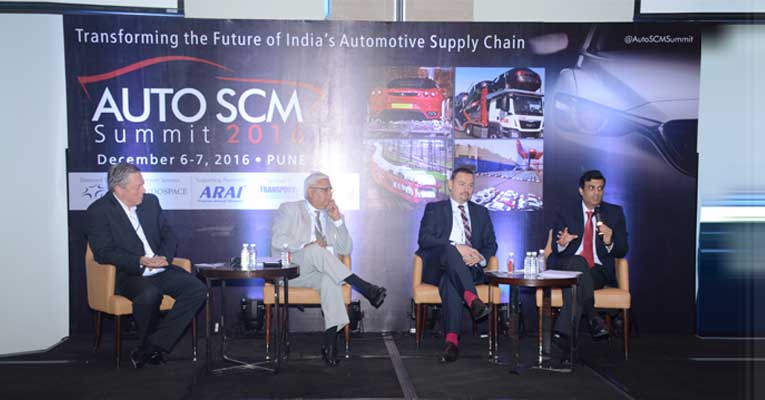1st edition of AUTO SCM Summit kicks off in Pune

Dec 07, 2016: The first edition of two-day AUTO SCM Summit organised by Indian Transport & Logistics News (ITLN) kicked off at Courtyard Marriott Chakan, Pune yesterday. The theme of the maiden Summit was ‘Transforming the future of India's automotive supply chain’. The summit brought together supply chain managers of automotive manufacturers and logistics service providers discussing ideas and sharing best practices to mutual benefits. With Indian automotive industry experiencing an interesting evolutionary phase, AUTO SCM Summit played a perfect platform to network with the right set of business associates.
The long-term growth story is strong, but short-term volatility is creating an environment of uncertainty. India is the sixth largest automotive producer in the world (with an average annual production of 24 million vehicles in 2016, of which 3.6 million exported). India is the second largest two-wheeler manufacturer, the largest motorcycle manufacturer. The automotive industry accounts for 45 per cent of the country’s manufacturing gross domestic product (GDP), 7.1 per cent of the country’s GDP and employs about 19 million people both directly and indirectly. By 2026, India is expected to be the third largest automotive market by volume in the world.
Most global OEMs view India as a strategic market of the future and as a result competition is intensifying. With the advent of new technologies and evolving manufacturing trends in the automotive industry, transformation of the value chain is inevitable. Building an agile supply chain is crucial to the success of any automotive company.
The opening address was made by Rahul Nangare, IRS, Additional Commissioner of Customs, Jawaharlal Nehru Custom House, Nhava Sheva. Breaking the ice, Nangare mentioned that customs should not be perceived as a problem. We are working as facilitators. We want shippers to come forward, interact with us and make the best use of our recent initiatives. He added, “Customs is not a road block. Around 70-80 per cent of cargo is not examined or assisted. It is based on self declaration. We have also introduced Direct Port Delivery (DPD), which will make a big difference. Customs Department has also become pro industry like the current government. Prior bill of entry is what going to make a change in terms of time savings. Customs Department has also become pro industry with the current government.”
Making an opening remark, Dirk Schusdziara, Senior Vice President Cargo, Fraport AG, said, “India is an important market for trade. Last year 100,000 tonnes of air cargo was handled on direct flights from Frankfurt to Indian cities. In the first ten months this capacity has increased by 20 per cent. The figures clearly mention the potential of Indian market.”
The first day deliberated on transforming the future of India's automotive supply chain, future of India’s automotive export scenario and challenges ahead; enhancing auto components supply chain and finished vehicles logistics. The panelist agreed that collaboration and digitisation is the way forward. Goods & Services Tax (GST) and Single Window Interface for Facilitating Trade (SWIFT) will be a game changer. Although infrastructure is a challenge in India however, investments in infrastructure in road, rail, sea and air transport will help to boost the business.




